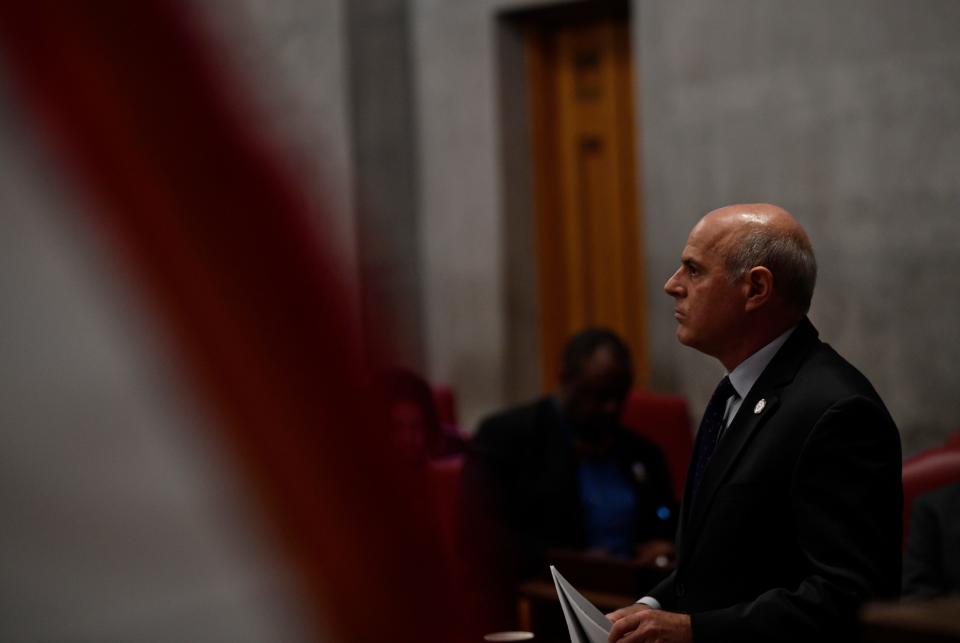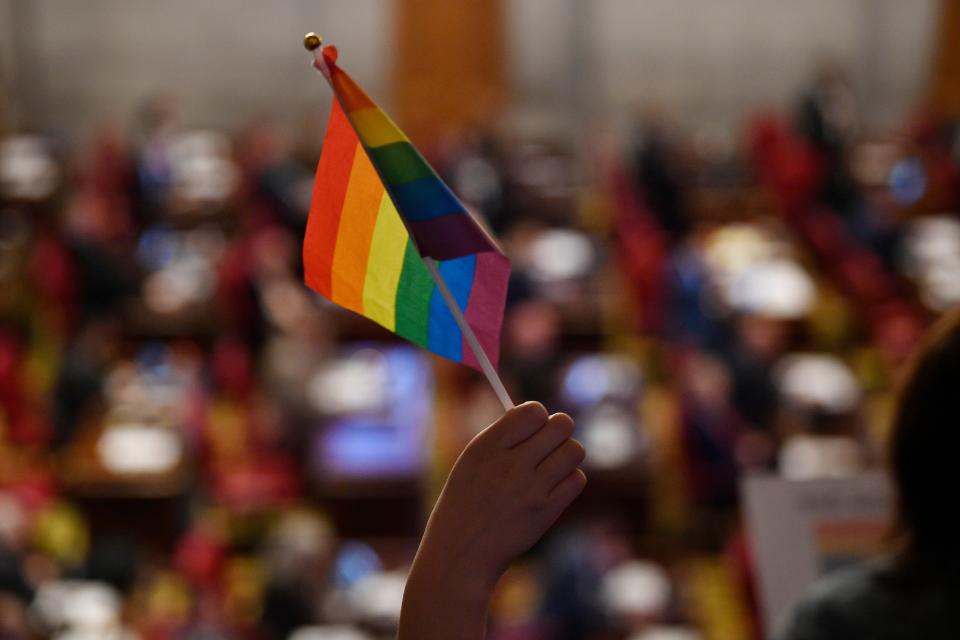Tennessee House passes bill along party lines to ban pride flags in public schools
- Oops!Something went wrong.Please try again later.
- Oops!Something went wrong.Please try again later.
A bill that would ban the display of pride flags and ideological flags in Tennessee public schools ― but does not explicitly prohibit display of the Nazi or Confederate flags in schools ― passed the full state House on Monday.
House members passed House Bill 1605 on a party-line vote of 70 to 24, with one member present, not voting.
The bill, sponsored by Rep. Gino Bulso, R-Brentwood, would prohibit the display of any flags that “represent a political viewpoint, including but not limited to, a partisan, racial, sexual orientation, gender, or other ideological viewpoint.”
A companion bill could be up for a final vote in the Senate as early as Thursday, having passed the Senate Education in a 5 to 4 vote last week.

“Do parents have the right to instill values in their own children that they agree with?” Bulso asked during House debate on Monday. “If you have parents across the state who want to instill in their children values represented by the pride flag, they are certainly entitled to do that. On the other hand, if you have parents who want to instill values in their children that are not consistent with the values represented by the pride flag, they have the ability to do that.”
“Everyone is entitled to mutual respect. Everyone is entitled to mutual dignity. Everyone is entitled to tolerance,” Bulso said. “What this bill does is it preserves tolerance across the board for all parents and all school children.”
Bulso has objected to the display of the pride flag and the “set of values” it represents, saying it represents elevation of “same-sex marriage to the same status of traditional marriage.”
He confirmed Monday he brought the legislation on behalf of parents in his district who are concerned about display of the pride flags in Williamson County Schools classrooms.
“The cause was a concern by parents in my district and one school board member that certain teachers and counselors in our district were displaying a pride flag in the classroom and on a teacher’s desk, despite the fact that parents had objected to that display,” Bulso said. “I agreed to help them.”
Debate on the bill was cut short by a call for the question — after which an outburst broke out in the House gallery. After vehemently seeking recognition to speak, Rep. Justin Jones, D-Nashville, was ruled out of order, and the Republican supermajority affirmed the ruling by a House vote.
Democratic-led amendments voted down
Republicans voted down two amendments offered by Democrats, who vocally opposed Bulso's bill.
Rep. Jason Powell, D-Nashville, offered an amendment seeking to allow students to express themselves however they choose “as long as it does not materially disrupt school activities."
“I am against this bill. I think it is a terrible idea,” Powell said. “Right now, this bill is targeting students.”

“To protect the rights of students in our state who want to continue to support and encourage their fellow students who they feel are going to be targeted as a result of the passage of this bill,” Powell said.
Powell argued more clarity is needed to avoid costly “frivolous lawsuits” brought against school districts. For example, he cited students who want to do a school project about someone they admire – like LGBTQ activist Harvey Milk – and whether they will continue to be permitted to do so.
“We are going to have students who are going to feel unwelcome,” Powell said. “They’re going to feel like their state and their community doesn’t support them because of this bill.”
Bulso moved to table Powell’s amendment, arguing that “neither the bill nor the existing statute has anything to do with what students may or may not do.”
Powell’s amendment failed 72 to 23.
Rep. Justin Pearson, D-Memphis, offered an amendment to specifically include the “War Between the States” flag as one the bill would ban. The bill currently permits the display of flags protected by the Tennessee Heritage Protection Act.
“The signal that it is giving is evil and wrong,” Pearson said of Bulso’s bill, calling the entire effort “immoral and unjust.”
Members declined along party lines to consider Pearson’s amendment, as it was not timely filed.
'Barbs of hatred and bigotry'
Rep. Bo Mitchell, D-Nashville, accused Bulso of seeking to single out the LGBTQ community.
“Your whole mission in this piece of legislation was to point one segment of the population out that you may not agree with,” Mitchell said. “That’s awful.”
“I’m sick of legislation like this that just brings problems,” he said. “We’re coming for one segment today – eventually they’re going to come for you.”

In response, Bulso said “not a syllable of what you just heard over the past five minutes is true,” prompting audible laughter from the gallery.
“I am proud to stand up here on behalf of parents across the state, regardless of how many barbs of hatred and bigotry you want to throw against those parents,” Bulso said.
Bulso denied that any group of individuals would be negatively impacted by the legislation.
Rep. Sam McKenzie, D-Knoxville, again questioned Bulso on whether Confederate flags and Nazi flags would be permitted, should the bill ultimately become law. Bulso argued that parameters on display of those flags would not change.
“Your presumption that somehow this bill would allow a Confederate flag in a manner that the law does not already allow is simply incorrect,” Bulso said.
The bill specifically permits display of flags as protected by the Tennessee Heritage Protection Act, including the Confederate flag.
During a discussion of a previous version of the bill, Bulso had asserted that display of the pride flag on coffee mugs, necklaces, and tattoos would not be permitted. The bill has since been amended.
“If someone has a flag tattooed on their person, you’re telling me that that person has to cover that up, if it was on his or her arm – or quit being an educator, is that correct?” McKenzie said.
“No,” Bulso replied.
An outburst broke out in the gallery above – and House Speaker Cameron Sexton, R-Crossville, ordered troopers to remove an individual from the room.
Rep. Aftyn Behn, D-Nashville, said that while Bulso has argued that the pride flag has been used to indoctrinate students, displaying a flag does not indicate an attempt to indoctrinate. Behn cited a group of neo-Nazis that demonstrated with flags in Nashville this month, noting that they were not seeking to recruit tourists.
“Merely displaying a flag doesn’t inherently constitute indoctrination,” she said. “The pride flag is a powerful symbol that communicates acceptance and support of our LGBTQIA community by providing social representation.”
Vivian Jones covers state government and politics for The Tennessean. Reach her at vjones@tennessean.com.
This article originally appeared on Nashville Tennessean: TN House passes bill to ban pride flags in public schools

